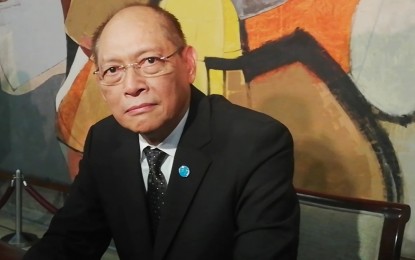
BSP Governor Benjamin Diokno
MANILA – The Philippine economy is expected to weaken by 0.4 percent this 2020 amid the expected 5-percent contraction in remittances due to the pandemic, but a 4-percent rebound is expected in 2021.
In a virtual briefing Thursday, Bangko Sentral ng Pilipinas (BSP) Governor Benjamin Diokno said the projected drop of inflows from overseas Filipino workers (OFWs) this year is based on the projected job losses and repatriation of workers.
He explained the 0.4-projected slowdown of the economy is a rough computation since their forecasts “are subject to review again because we really don’t know the extent of the pandemic and what’s the outcome in the host countries.”
Diokno said the contraction forecast on remittances was based on the assumption that about 200,000 to 300,000 OFWs, mostly working on tourism-related services, will lose their jobs.
To date, less than 50,000 OFWs have been repatriated, he said.
“But as you know there are many Filipinos who are in the medical sector like nurses and doctors and looking forward, I think, we should continue to train medical workers here in the Philippines so that maybe in the next pandemic we’ll have a lot of Filipino workers abroad and also working here in the Philippines,” he added.
The original remittances growth projection for this year is an expansion of 3 percent but monetary officials changed this to 2 percent on expectations that there will be lesser inflows from Europe and the US on account of the pandemic.
Diokno said they later changed the already revised projection to -5 percent after citing the job losses of sea-based workers or those working in the cruise ships and cargo ships.
Meanwhile, he is confident that the country will not be included in the “gray list” of the Paris-based Financial Action Task Force (FATF), which, in turn, will affect remittance inflows.
Diokno said the pandemic has resulted in the extension of the period for the country to comply with the deadline to address the gaps discovered in the country’s anti-money laundering and counter-terrorism financing system.
FATF, on its Mutual Evaluation Report (MER) published in October 2019, gave the government 12 months to implement amendments on the Human Security Act (HSA) to prevent the country’s inclusion in the gray list, which indicates a deficiency in a financial system that makes it prone to money laundering and terrorist financing.
The deadline was pushed to February 2021 because of the pandemic.
Diokno is confident that the country’s compliance with international anti-money laundering policies will not be downscaled anew since the proposed Anti-Terrorism Bill has been submitted to Malacanang for the President’s signature.
“I don’t think we’ll be on the gray list. I’m very positive that we will not be put on the gray list because, as I’ve said, we have, I think, complied with one of the most important requirements for the review of the anti-money laundering compliance,” he added.
FATF blacklisted the country in 2002 after noting that the Philippines lacked measures to prevent money laundering activities.
In September 2001, Republic Act 9160, otherwise known as the Anti-Money Laundering Act of 2001, was enacted into law and took effect the following month. This improved the country’s level of compliance.
In June 2012, FATF elevated the country to the gray list due to the enactment of the Anti-Money Laundering Act (AMLA), otherwise known as the Republic Act 10168, that criminalizes terrorist financing as a stand-alone offense.
In 2017, the task force removed the Philippines from its watch list after the enactment of Republic Act 10927, which included casinos as among the covered institutions of the Anti-Money Laundering Council (AMLC). (PNA)
 The Philippine News Agency is a web-based newswire service of the Philippine government under the supervision of the News and Information Bureau (NIB) of the Presidential Communications Office (PCO).
The Philippine News Agency is a web-based newswire service of the Philippine government under the supervision of the News and Information Bureau (NIB) of the Presidential Communications Office (PCO).